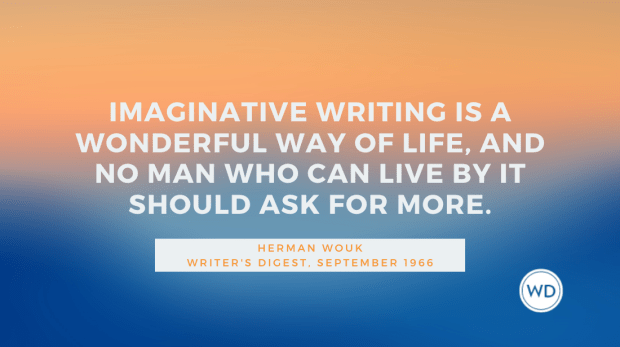In celebration of Herman Wouk’s birthday, we revisit his 1966 interview with former WD editor-in-chief, Kirk Polking.
By Kirk Polking
September 1966

Kirk Polking: How important were family, teachers, friends in inspiring you or presenting obstacles for you to overcome?
Herman Wouk: My immigrant mother bought a set of Mark Twain from a door-to-door salesman working our Bronx tenement house. At the age of eleven I had read most of Twain over and over. My father loved Yiddish literature, especially Sholem Aleichem, and read aloud to us each Friday night for many years. I was thus soaked in the best kind of writing from childhood. I always loved books, and learned to revere literature. My grandfather gave me the key to rabbinic writings. From Irwin Edman, my mentor at Columbia College, I learned the beginnings of philosophy and an appreciation of the arts. Fred Allen, who employed me as a writer, taught me much about comedy, and about direct style. In the Navy, I learned management of time, and gained insights into war, science, and machinery. This varied background was very lucky for me.
K.P. Do you think where a writer lives is important? Do climate and/or other aspects of your environment affect your writing output?
H.W. When I was unknown, working in the wardroom of a minesweeper in the South Pacific, and then in an attic room of a little house in Northport, Long Island, I wrote several novels and plays in a few years, including The Caine Mutiny. Thereafter Marjorie Morningstar and The Caine Mutiny Court-Martial were written in New York City under mounting difficulties. This decided me to move to the Virgin Islands, where I regained my former work pace. It seems unarguable to me that a quiet remote place is best for writing.
K.P. What are your working methods? Do you write every day? Are you a morning or a night writer?
H.W. I try to write a certain amount each day, five days a week. A rule sometimes broken is better than no rule. My work hours are the morning and early afternoon.
[You might also enjoy this 2003 interview with Richard Russo.]
K.P. How do you feel about Government and/or private subsidy of writers?
H.W. I have never asked for a grant, fellowship, or subsidy. But I know those funds are vital for some important writings not likely to be self-supporting, including much poetry and scholarship.
K.P. What percentage of a writer’s talent do you think is a gift he’s born with, and what percent mastery of a craft?
H.W. Without the gift all effort is useless. With it, but without long serious study of the masters, a writer can either fail or do inferior work.
K.P. Are there certain contemporary writers whom you especially admire? Are there, similarly, some you feel are overrated?
H.W. There are certainly underrated ones. It is a crowded, difficult art. Success, reputation, audience are earned by some striking quality, not always admirable – it can be profundity, poetic brilliance, narrative power; it can be mere imaginative pornography, or a knack for crude sensation, or a skill at self-promotion. Fine authors are neglected. Each season the vogue runs on one or two novels, and for the rest, people are content to glance at reviews. The paperback revolution, happily, is changing this state of affairs, and giving all writers more of an audience. Even Faulkner first broke through to the general audience via the paperback.
Critics make errors in guessing about the ultimate value of authors. But that has always been true of the literary life. Balzac, Twain, and Maugham were dismissed as hacks in their day. This gives a permanent franchise to vulgar writers to consider themselves misunderstood abused failures; this encourages damned geniuses. Melville and Stendhal were authors to persevere and endure. In the long run justice is done. In the short run geniuses, minor writers, and mountebanks alike must just take their chances. Imaginative writing is a wonderful way of life, and no man who can live by it should ask for more.
K.P. Which honor or recognition or compliment has meant the most to you in your writing career?
H.W. When I was 30, my first novel, Aurora Dawn, was selected by the Book-of-the-Month Club. The Pulitzer Prize for fiction came to The Caine Mutiny when I was 35. In my 40th year Time magazine published a cover story on my early work. It is chic to sneer at such accolades, I know, but each was a memorable event to me, and I see no reason to pretend otherwise.
John Marquand gave me the most poignant compliment. I had sent him the manuscript of Marjorie Morningstar with real nervousness. I was following an overpowering hit, the kind that has sunk many a writer, with a work wholly different in style and substance. My future as an author, I knew, might well turn on this event. Mr. Marquand came to my New York apartment, and convinced me that, by his strict standards, the work was good. It was a once-in-a-lifetime, unforgettable gesture from a famous author to one still trying to make his way, and facing his worst test.
K.P. Is there some facet of writing, or the writer’s life in America, on which you feel strongly and would like to address you views to other writers?
H.W. The imaginative artist willy-nilly influences his time. If he understands his responsibility and acts on it – taking the art seriously always, himself never quite – he can make a contribution equal to, if different from, that of the scientist, the politician and the jurist.
The anarchic artist so much in vogue now – asserting with vehemence and violence that he writes only for himself, grubbing in the worst seams of life – can do damage. But he can also be so useful in breaking up obsolete molds, exposing shams, and crying out the truth, that the broadest freedom of art seems to me necessary to a country worth living in.
HERMAN WOUK
The author was born in New York City and graduated from Columbia College in 1939. After a short career as a script-writer for Fred Allen, he entered the Navy as a line office at the outbreak of World War II. From this experience can Wouk’s third novel, The Caine Mutiny (1951) and the triple success the writer dreams about: a play and a movie version running simultaneously after a long hold on the best-seller list and a Pulitzer Prize. His fourth novel, Marjorie Morningstar reinforced his popularity with readers, selling 3,4000,000 copies in all editions. His most recent novel is Don’t Stop the Carnival.

Be First to Comment